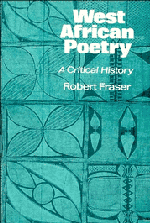Book contents
- Frontmatter
- Contents
- Acknowledgements
- West Africa: State borders and principal ethnic groupings
- Introduction
- 1 From oral to written verse: development or depletion?
- 2 Ladies and gentlemen
- 3 The négritude movement
- 4 Poetry and the university, 1957–63
- 5 The achievement of Christopher Okigbo
- 6 Continuity and adaptation in Ghanaian verse, 1952–71
- 7 Two Ijo poets
- 8 ‘Psalmody of sunsets’: The career of Lenrie Peters
- 9 The road to Idanre, 1959–67
- 10 The poet and war, 1966–70
- 11 The poetry of dissent, 1970–80
- 12 The return to orality
- A guide to availability
- Index
8 - ‘Psalmody of sunsets’: The career of Lenrie Peters
Published online by Cambridge University Press: 03 May 2011
- Frontmatter
- Contents
- Acknowledgements
- West Africa: State borders and principal ethnic groupings
- Introduction
- 1 From oral to written verse: development or depletion?
- 2 Ladies and gentlemen
- 3 The négritude movement
- 4 Poetry and the university, 1957–63
- 5 The achievement of Christopher Okigbo
- 6 Continuity and adaptation in Ghanaian verse, 1952–71
- 7 Two Ijo poets
- 8 ‘Psalmody of sunsets’: The career of Lenrie Peters
- 9 The road to Idanre, 1959–67
- 10 The poet and war, 1966–70
- 11 The poetry of dissent, 1970–80
- 12 The return to orality
- A guide to availability
- Index
Summary
It can be highly misleading to see any literary tradition as an affair of groups and cabals, sects and sub-sects, pressure groups and ‘schools’. The career of Lenrie Peters, with its twenty years of solid achievement, bears witness to the fact that the best work was often done alone, in a small room at dead of night with little or no active contact with other practitioners in the same art, save the perusal of printed volumes of the poets of other ages and places with whom the reader may or may not have much in common. If Peters were considered at the point of his emergence in the mid-sixties with a small pamphlet from the prestigious Mbari publishing house, he might appear as a member of the same age-set as Pepper Clark, Soyinka and others of the Ibadan school. In reality, when his first poems began to appear he was far distant from the African scene working as medical student, houseman and later surgeon in the hospitals of metropolitan Britain. At Cambridge he read natural sciences with their own demands for precision and technical virtuosity, was briefly involved in student politics, but experienced limited exposure to that troubled, heart-searching debate on ways and means, fashion and precedent, which sustains literary aspirants in an English department. He learned to write in his own way, coasting around the more obvious fields of posture and protest, reading widely, coming to his own distinctive conclusions.
- Type
- Chapter
- Information
- West African PoetryA Critical History, pp. 200 - 230Publisher: Cambridge University PressPrint publication year: 1986



